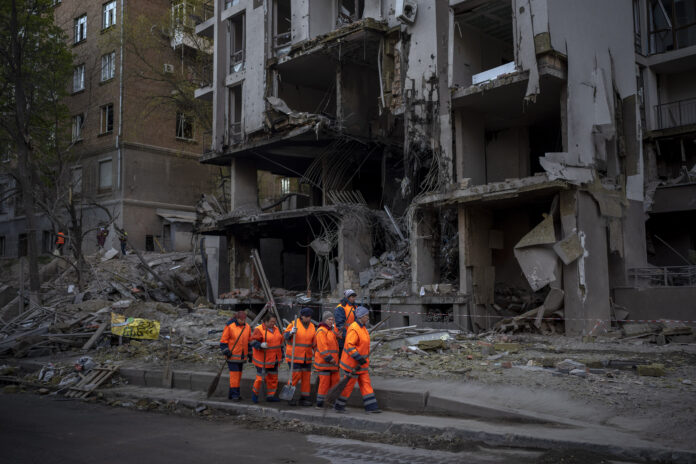As Ukraine faces a “very important” phase of its fight against the Russian invasion in the coming weeks, it needs more weapons from allies, including Canada, to boost that fight, says the country’s ambassador-designate.
Yuliia Kovaliv addressed MPs at the House of Commons foreign affairs committee on Monday and urged Canada to continue its support for Ukraine. She said Ukraine needs more heavy weaponry, and for Canada to advocate for an oil and gas embargo against Russia and investigations into war crimes.
“We need military aid now,” said Kovaliv. “We do expect that the next few weeks will be very important in terms of defending our territory, so we urge for the military support within the next days and weeks.”
Her testimony comes after Foreign Affairs Minister Melanie Joly warned last week that Canadian officials expect Russian aggression to escalate ahead of May 9, when Russia celebrates ‘Victory Day’.
Joly pointed to the date during the committee as a factor in the rapid scale-up of military weaponry being sent or pledged to Ukraine by NATO allies. That includes Howitzer missiles and armoured vehicles sent from Canada over the past week.
Kovaliv said Ukraine needs more, and fast.
“The situation in Ukraine is challenging. The missile attacks are everywhere, even Lviv,” she said, referencing the western Ukrainian city furthest from the most intense fighting now centred in the east.
As Russia shifts the bulk of its aggression to the eastern Donbas region, countries including Canada are weighing timelines for reopening embassies in Ukraine’s capital, Kyiv.
Last week Joly said her hope is for Canada to reopen its embassy there within the coming days or weeks, in concert with allied countries.
Kovaliv described the reopening of embassies in Kyiv as “important” but when asked whether Ukraine could assure the safety of diplomats, responded: “The only guarantee for protection of civilians…is (more) military aid to Ukraine.”
Trending Stories
Bill Murray accepts his behaviour on set led to complaint, pause of latest film
Mattea Roach’s family on her Jeopardy! win streak, and handling public scrutiny
‘We need to eliminate Russia from the world stage’: Retired Gen. Breedlove
Several times, Kovaliv thanked Canadian officials and Canadians for their support of Ukraine.
“History books will commend Canada for its strong stand with Ukraine against Russia’s barbaric war,” she told the committee MPs before praising the proposal to give the foreign affairs minister the power to seize and sell Russian oligarch assets.
Those proceeds, the government has said, would go to Ukraine to support its rebuilding — a key need, Kovaliv said, in the wake of the destruction wrought by Russia.
“The estimated damages to Ukrainian economy are now counted in hundreds of billions of dollars,” she said. “Hence, we need a recovery strategy that is similar to the Marshall Plan after World War Two.”
The Marshall Plan was the economic recovery and reconstruction program funded by the U.S. to rebuild European infrastructure, primarily in allied countries, after the end of that conflict.
Those programs rolled out roughly US$13 billion at the time, which would be worth approximately US$168 billion now, accounting for inflation.
Many of the questions from MPs focused on human suffering inflicted by Russian forces, in particular, the reported use of sexual violence against Ukrainians.
Human rights groups and journalists have published dozens of reports detailing allegations of rape and sexual violence by Russian soldiers, while Ukrainian officials have said the numbers are in the hundreds.
Last month Deputy Prime Minister Chrystia Freeland called the reports suggesting systemic rapes and sexual violence “chilling.”
Kovaliv said Ukraine is working to document and track all reports of sexual violence, including, cases involving Ukrainian children.
The House of Commons adopted a motion by unanimous consent last month recognizing Russian atrocities in Ukraine as “genocide.” That motion also acknowledged the “widespread instances of physical harm, mental harm and rape,” in addition to numerous other atrocities.
Four streams of investigation are currently underway: one by the United Nations human rights council looking at war crimes, one through the International Criminal Court, one through the International Criminal Court of Justice, and one through the Organization for Security and Co-operation in Europe.
UN cites growing evidence of Russia war crimes in Ukraine – Apr 22, 2022
© 2022 Global News, a division of Corus Entertainment Inc.



